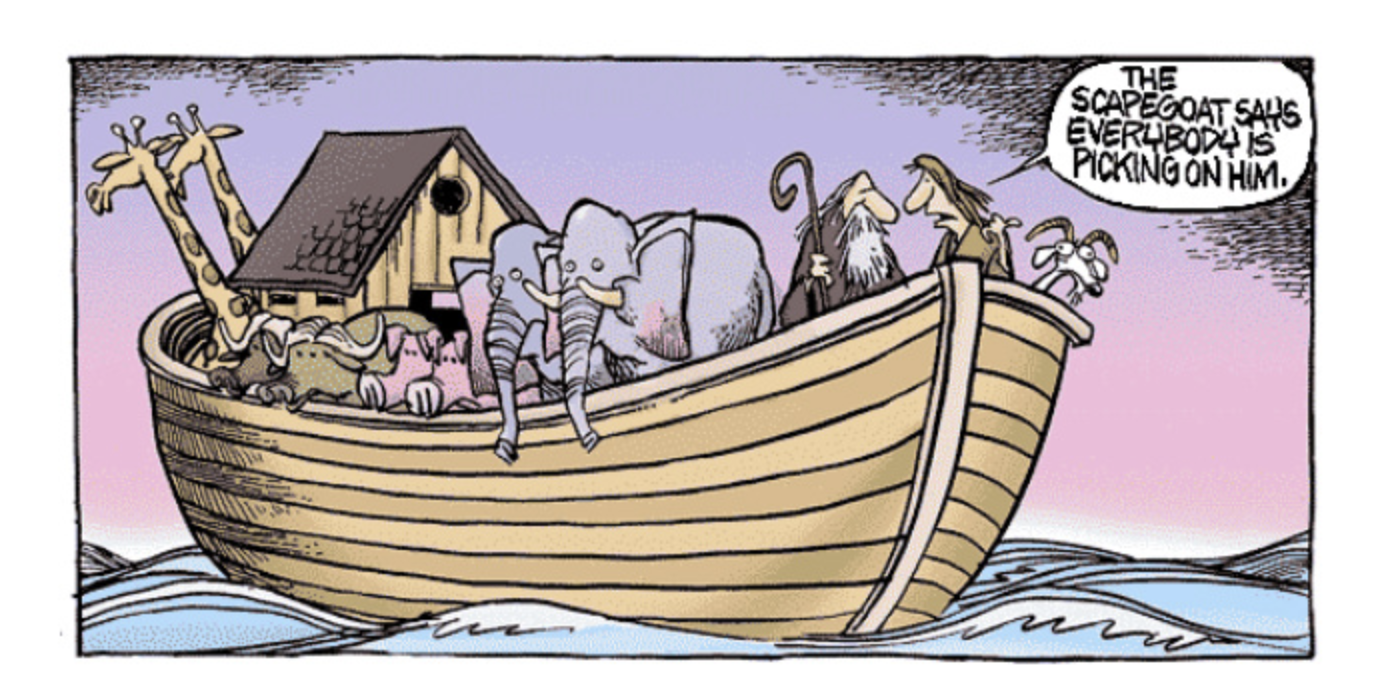
The scapegoating of another seems a common place in today’s politics. If we can ascribe something negative towards a group of people then we can make ourselves look better – without attributing anything positive to ourselves.
In this week’s Gospel reading (John 6: 35,41-51) the crowd which have followed Jesus and the disciples across the Lake of Galilee to Capernaum seem to have morphed into the Jews. But what are these Jews? In the Greek the word is Ioudaioi and is used predominately in the Gospel of John and int eh Book of Acts. IOf the 180 instances 150 occur in these two books alone. The term Ioudaioi is used to describe those who are against Jesus’s teachings. Remember that the Book of Acts was written around 75-80CE and John” Gospel from 80-100CE, many decades after the Resurrection. Using this term, and translated into the English as “Jews”, we are left with a good guy/bad guy approach, seemingly splitting the people into a binary division.
Could it be that the modern reader might, possibly might, attribute these texts as anti-semitic?
Smith, D. Moody. 1990. “Judaism and the Gospel of John,” in Charlesworth, ed., 91
Isolation of the Johannine community
Many scholars now agree that the writing of John’s Gospel was prompted by the need to respond to the expulsion of the Johannine community from the synagogue. The identity of the author(s) of the Gospel are still very much up for debate. Some think it could be John Mark, Lazarus, Mary Magdalene or John, son of Zebedee – or a group of Johannine followers. If this group were excluded post the razing of the Temple in 70CE, fuelling the importance of following Rabbinic codes or the radical message of Jesus we might well see a schism forming. Does that mean that scapegoating is acceptable.
Scapegoating of the Jews was also found in World War 2, with some connections back to this Gospel. Frightening.
Most standard, English translations of the New Testament still translate hoi ioudaioi as “the Jews” (Revised Standard Version, New Revised Standard Version, King James Version, New Jerusalem Bible, New International Version). But exceptions have appeared: the New Testament: Judaean and Authorized Version(1970) translates hoi ioudaioi as “Judaeans” (and sometimes “Hebrews”), while the Contemporary English Version (American Bible Society) opts to render select instances of hoi ioudaioi as “the leaders of the people,” or simply “the leaders,” or “the temple police.”
Jews or Judeans?
We could find that by moving from Jews to Judeans we are missing the context of the debate back then. It wasn’t all Jews, as the Johannine community were also predominately Jews. It was describing the heated tensions at the time. It most certainly wasn’t trying to paint that ALL Jews were ones that despite the teachings of Jesus.
The hoi Ioudaioi criticise Jesus, not about his teachings but with their focus upon his parents (John 6:42). They still are not aware of the deeper meaning of the bread that Jesus speaks of – possibly they are still focussed upon manna that Moses asked of God.
Heaven and Hell?
The passage seems to conclude with a focus upon those that died and those that will live forever. Pretty straight forward in most Christian doctrine, except that Jesus may not have held beliefs of Heaven and Hell as we may perceive those ‘destinations’.
Hell is mentioned, in English versions, but it again predominately is referring to Gehenna, the fiery pit outside Jerusalem, where, according to the Old Testament, ancient Israelites practiced child sacrifice to foreign gods.
Gehenna isn’t burning today, so no eternal fire there.
Heaven is of the here and now. Jesus didn’t speak of healing others, helping our neighbour in the next life but in this life. Greek thought at the time was one of a conscious after life, no talk of an enteral body, or complete annihilation (death but not torture).
So there are two paths: one with God and one of death. One does last forever, one doesn’t. You may see now why there was so much heated debate. Nevertheless, what we must not do is to attribute labels to whole swathes of folk. Scapegoating is not acceptable.
Who might we be scapegoating today?
Cover Photo by https://misleadingscapegoat.weebly.com
We often think of what will happen in the afterlife and often that fear is weaponised by established churches that is why when jesus said in the gospel of thomas the kingdom of god is within you and all around you is so important . We can experience his kingdom this day this minute and that is the wonderful truth of the christian gospel , risen people walking with a risen christ. today
Indeed. Jesus spoke in the other Gospels of heaven on earth albeit many have pointed upwards in the hope that heaven was there. Fear is a word that could describe how churches have driven people to believe. Jesus didn’t use such methods.
Totally agree with you.